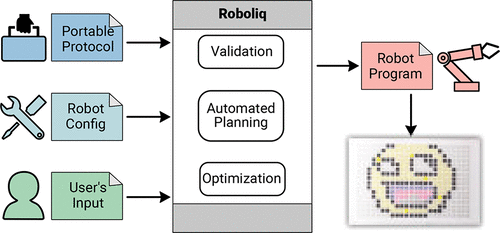当前位置:
X-MOL 学术
›
ACS Synth. Biol.
›
论文详情
Our official English website, www.x-mol.net, welcomes your
feedback! (Note: you will need to create a separate account there.)
Automated Planning Enables Complex Protocols on Liquid-Handling Robots
ACS Synthetic Biology ( IF 3.7 ) Pub Date : 2018-02-27 00:00:00 , DOI: 10.1021/acssynbio.8b00021 Ellis Whitehead 1 , Fabian Rudolf 1 , Hans-Michael Kaltenbach 1 , Jörg Stelling 1
ACS Synthetic Biology ( IF 3.7 ) Pub Date : 2018-02-27 00:00:00 , DOI: 10.1021/acssynbio.8b00021 Ellis Whitehead 1 , Fabian Rudolf 1 , Hans-Michael Kaltenbach 1 , Jörg Stelling 1
Affiliation

|
Robotic automation in synthetic biology is especially relevant for liquid handling to facilitate complex experiments. However, research tasks that are not highly standardized are still rarely automated in practice. Two main reasons for this are the substantial investments required to translate molecular biological protocols into robot programs, and the fact that the resulting programs are often too specific to be easily reused and shared. Recent developments of standardized protocols and dedicated programming languages for liquid-handling operations addressed some aspects of ease-of-use and portability of protocols. However, either they focus on simplicity, at the expense of enabling complex protocols, or they entail detailed programming, with corresponding skills and efforts required from the users. To reconcile these trade-offs, we developed Roboliq, a software system that uses artificial intelligence (AI) methods to integrate (i) generic formal, yet intuitive, protocol descriptions, (ii) complete, but usually hidden, programming capabilities, and (iii) user-system interactions to automatically generate executable, optimized robot programs. Roboliq also enables high-level specifications of complex tasks with conditional execution. To demonstrate the system’s benefits for experiments that are difficult to perform manually because of their complexity, duration, or time-critical nature, we present three proof-of-principle applications for the reproducible, quantitative characterization of GFP variants.
中文翻译:

自动化计划可在液体处理机器人上启用复杂协议
合成生物学中的机器人自动化与液体处理特别相关,以促进复杂的实验。但是,实践中尚未高度标准化的研究任务仍然很少自动化。造成这种情况的两个主要原因是将分子生物学协议转换为机器人程序所需的大量投资,以及生成的程序通常过于具体而无法轻松重用和共享这一事实。液体处理操作的标准化协议和专用编程语言的最新发展解决了协议的易用性和可移植性的某些方面。但是,它们要么专注于简单性,而以启用复杂协议为代价,要么它们进行详细的编程,并需要用户提供相应的技能和精力。为了调和这些权衡,我们开发了Roboliq,该软件系统使用人工智能(AI)方法将(i)通用的形式化但直观的协议描述,(ii)完整但通常是隐藏的编程功能以及(iii)用户系统交互集成到自动生成可执行的,优化的机器人程序。Roboliq还可以通过条件执行来对复杂任务进行高级说明。为了证明该系统对于因复杂性,持续时间或时间紧迫性而难以手动执行的实验的好处,我们提出了三种原理证明应用,用于可重复,定量表征GFP变体。编程功能,以及(iii)用户与系统的交互,以自动生成可执行的,优化的机器人程序。Roboliq还可以通过条件执行来对复杂任务进行高级说明。为了证明该系统对于因复杂性,持续时间或时间紧迫性而难以手动执行的实验的好处,我们提出了三种原理证明应用,用于可重复,定量表征GFP变体。编程功能,以及(iii)用户与系统的交互,以自动生成可执行的,优化的机器人程序。Roboliq还可以通过条件执行来对复杂任务进行高级说明。为了证明该系统对于因复杂性,持续时间或时间紧迫性而难以手动执行的实验的好处,我们提出了三种原理证明应用,用于可重复,定量表征GFP变体。
更新日期:2018-02-27
中文翻译:

自动化计划可在液体处理机器人上启用复杂协议
合成生物学中的机器人自动化与液体处理特别相关,以促进复杂的实验。但是,实践中尚未高度标准化的研究任务仍然很少自动化。造成这种情况的两个主要原因是将分子生物学协议转换为机器人程序所需的大量投资,以及生成的程序通常过于具体而无法轻松重用和共享这一事实。液体处理操作的标准化协议和专用编程语言的最新发展解决了协议的易用性和可移植性的某些方面。但是,它们要么专注于简单性,而以启用复杂协议为代价,要么它们进行详细的编程,并需要用户提供相应的技能和精力。为了调和这些权衡,我们开发了Roboliq,该软件系统使用人工智能(AI)方法将(i)通用的形式化但直观的协议描述,(ii)完整但通常是隐藏的编程功能以及(iii)用户系统交互集成到自动生成可执行的,优化的机器人程序。Roboliq还可以通过条件执行来对复杂任务进行高级说明。为了证明该系统对于因复杂性,持续时间或时间紧迫性而难以手动执行的实验的好处,我们提出了三种原理证明应用,用于可重复,定量表征GFP变体。编程功能,以及(iii)用户与系统的交互,以自动生成可执行的,优化的机器人程序。Roboliq还可以通过条件执行来对复杂任务进行高级说明。为了证明该系统对于因复杂性,持续时间或时间紧迫性而难以手动执行的实验的好处,我们提出了三种原理证明应用,用于可重复,定量表征GFP变体。编程功能,以及(iii)用户与系统的交互,以自动生成可执行的,优化的机器人程序。Roboliq还可以通过条件执行来对复杂任务进行高级说明。为了证明该系统对于因复杂性,持续时间或时间紧迫性而难以手动执行的实验的好处,我们提出了三种原理证明应用,用于可重复,定量表征GFP变体。











































 京公网安备 11010802027423号
京公网安备 11010802027423号